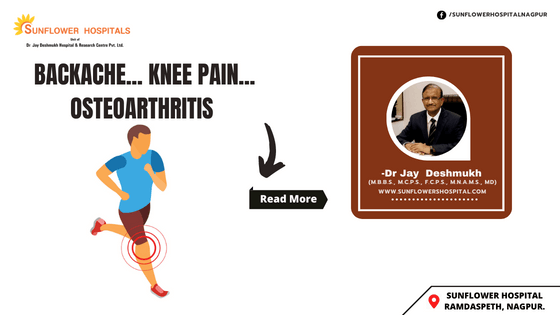What causes osteoarthritis?
The cartilage in the joints which covers the ends of bones and allows free movement between them gets worn out. In addition, bone spurs are found along the edges of the joints. What is the first step in the treatment of osteoarthritis? Getting the correct diagnosis initially is the first step. This may include clinical examination, X-rays, and certain blood tests. Blood tests do not confirm osteoarthritis, but are useful to exclude other forms of arthritis. There is no diagnostic blood test for osteoarthritis.
What are the risk factors for osteoarthritis?
This arthritis increases with age. The more you weigh, the greater the risk. Fat tissue also produces proteins that cause harmful inflammation in and around your joints. Injuries that occur due to accidents, sports injuries, and repetitive stress on a joint can lead to osteoarthritis. Certain metabolic conditions like diabetes increase your risk for osteoarthritis. Some inherit the tendency for osteoarthritis.
What are the complications of osteoarthritis?
This is a degenerative disease that worsens over time. This leads to chronic pain. Joint pains and stiffness can make daily tasks difficult. Sleep disturbances and depression can result due to pain and disability due to osteoarthritis.
What are the main symptoms of osteoarthritis?
They usually begin after the age of 40 years and vary considerably from person to person. It commonly involves fingers, feet, knees, hips, and spine. Less commonly it involves the elbow, wrist, shoulder, and ankle. The main symptom is joint pain that is worse with activity and relieved with rest. In severe cases, the pain may also occur at rest or at night. The pain typically occurs near the joint. Pain at the knees may be referred to as the shins. Morning stiffness that resolves in 30 minutes of rising is a common presentation. Stiffness also occurs throughout the day after the period of inactivity. More joint pains.
Do you get up in the morning with backaches, knee pains, and stiffness in your hands?
Do you have crackling or grafting sensations at joints? All your blood tests for arthritis are negative?
Well, this is Osteoarthritis, the commonest form of arthritis. There is no cure for this disorder. However, lifestyle changes, weight reduction, and exercises with muscle stretching are known to help. And stiffness can occur in cold, damp, or low-pressure weather.
What precautions are required to reduce pain?
A proper posture while walking is important. Avoid for-ward bending as much as possible. Avoid frequent use of stairs if you have knee pain. In the elderly, a walking stick would be useful. Be active throughout the day, with intermittent periods of rest. Avoid weight gain and have a positive attitude.
What about medications?
Painkillers or analgesics like Ibuprofen or Naproxen or Celecoxib can be used sparingly only in case of severe pain. They have side effects and can cause stomach ulcers and kidney damage. Paracetamol is the safest. Tramadol and other opiates are best avoided for long-term use. Local ointments, and hot and cold fomentation, may give temporary relief.
What about Glucosamine, chondroitin, and other dietary supplements?
There are conflicting results from clinical studies. They are expensive and have not been proven to be consistently beneficial. Calcium and vitamin D are not directly beneficial. They may help to prevent osteoporosis.
What about injections in the joints?
Steroids and Hyaluronate infections are tried. Those with significant pain not responding to other medications may benefit. There is a small risk of infection with steroids. Hyaluronate injections are expensive and there is no unequivocal evidence to suggest their benefit. What about knee and hip joint replacement? In specific cases, this surgery will reduce pain permanently and remarkably. The risk and benefits should be carefully analyzed Those who do not respond to physical therapy and simple pain-relieving drugs and X-ray evidence of severe arthritis benefit most.
What about nonconventional treatment and its benefits? Shoe insoles, platelet-rich plasma injections, nerve stimulation, acupuncture, fish oil, turmeric in the form of curcumin, and arthroscopy do not have scientific evidence to support their use in osteoarthritis.
Author: Dr Jay Deshmukh
Dr Jay Deshmukh is Chief Physician and Director, Sunflower Hospital, Nagpur Honorary Physician to Honorable Governor of Maharashtra and PondicherryCentral. Dr Jay Deshmukh is an M.B.B.S., M.C.P.S., F.C.P.S., M.N.A.M.S., MD From Internal Medicine – Bombay and New Delhi.


